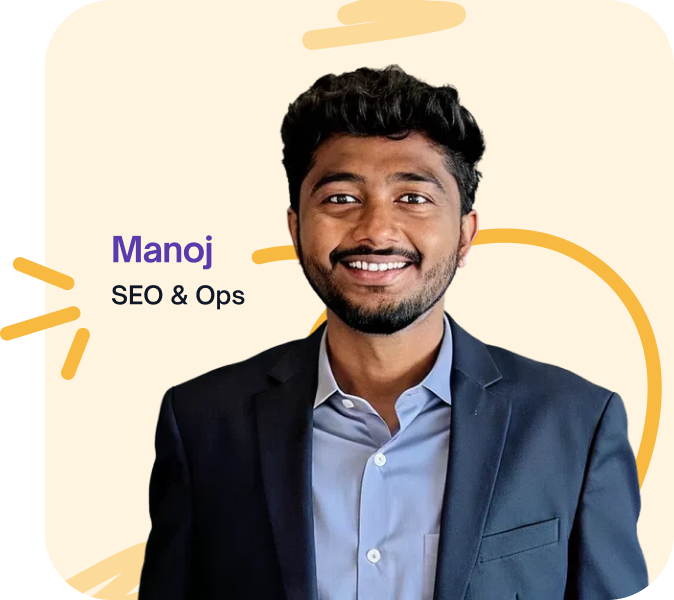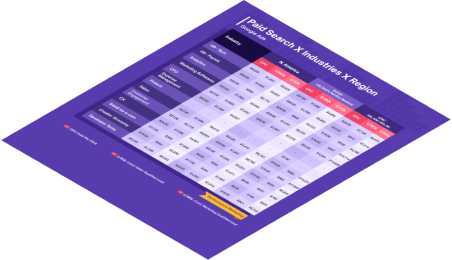Manoj Palanikumar has had a busy year, to put it mildly.
As TripleDart’s co-founder and head of SEO operations, he has spearheaded growth transformations for over a hundred companies this year alone—most of them looking to crack the elusive goal of generating leads from LLMs.
“The last couple of years for the SEO industry were rather uneventful; this year more than made up for it,” jokes Manoj.
With the year-end around the corner, many B2B SaaS brands are breaking their heads over what to focus on in 2026.
Over the last four years, Manoj has led growth transformations for over 200 clients, but 2025 has been particularly action-packed for the SEO Guru. Brand new areas like Generative Engine Optimization have popped up as critical challenges for SaaS brands, constantly keeping the team on its feet.
One side-effect of this year for SEO has been rampant misinformation. There are a lot of guides, posts, and checklists out there for cracking AEO, GEO, LLMEO, and all the other EOs one can think of. But there are few real-life documentations of how the day-to-day situation is; the reality of it all.
Which is why I sat down with Manoj for a chat unofficially titled What the Heck Should I do for GEO in 2026.
In this interview-article, Manoj shares a goldmine of wisdom on how to go about AI Search in the coming year, filled with real-life examples.
Read this before you create that 2026 masterplan. Let’s dive in.
First, let me address the elephant in the room: traffic drop. Gartner has predicted that there's going to be a 25% decline in traditional search by 2026. Do you think that much of a change will happen?
I would say so.
Here’s what’s happening with search behavior. People are still searching for vendors in Google, but when it comes to actionable queries like templates, formulas, “how-tos” - all those things are happening in the LLMs. We can classify them as actionable queries, and they are the main reason for the traffic drop from Google.
For example, if someone wanted to create a content calendar template, they previously searched on Google to identify a good template from, say, ClickUp or Asana. Now the users are doing that in LLMs to create the template directly.
There's a ton of fluff content about AI search. How do you decide what to rely on, especially when planning your own strategy?
I believe it’s fundamentally tricky if your north star is to generate traffic from LLMs. Because the KPI here is brand mentions (i.e., how many times an LLM spells out your brand name) and not direct citations from your website. Citations are good, but they are not the right metric to track because you cannot always assume that the user will click on the references.
So just keep an eye out for these kinds of half-truths.
But does it not make more sense to equate LLM citations with, say, a metric like impressions?
That seems to be a common misconception. Let me give you an example from a recent analysis we performed for a client.
We’d analyzed thousands of LLM queries last month, and we found that around 13% of the citations were from Reddit. When we performed the same analysis just a couple of days back, the number had gone down to 1%. This shows how much unpredictability there is in LLM citations.
The sources keep changing. And relying on citations also makes it easy to manipulate AI search data to fit your story, which is what a lot of SEO companies seem to be doing, unfortunately.
So, when you say brand mentions are what is the most important, do you also mean that on-page SEO will start to take a back seat in 2026?
Not exactly. Let me explain.
You shouldn’t completely rely on tracking just LLM traffic; the longer-term goal should be to build brand visibility and get your brand mentioned in these LLM answers. And for that, no matter how much effort you put into your website, the impact would probably be only 10% to 15%.
Rather than working solely on SEO hacks like adding schemas, you need to invest in brand marketing. LLMs identify your brand in the category not only from your website but also from other websites.
I see a lot of blogs say “if you add schema, you can get into LLM answers. If you add structure or make your content conversational, you can get into LLM answers.”
That is wrong. It’s a case of correlation, not causation. If you add schema, that would help LLMs understand better, but that is not “the hack to make LLMs mention your brand.”
For example, if anyone is searching for a customer support software for healthcare, you cannot expect LLMs to mention your brand just because you added schema and structured the content.
These tricks are already there for traditional SEO, so you don’t need to do them separately for AEO or GEO.
So these aspects, such as schema and content structure, are more like secondary-level tricks?
Yes.
They are very much relevant for traditional SEO, and they might make your existing content more presentable. But the focus must be on off-page SEO.
Earlier, off-page SEO mostly revolved around backlinks. Now, it’s about brand mentions, PR, and collaborating with websites (big aggregators like G2 are very important). It’s about getting people to talk about your brand, because only then can you create presence in the LLM training data.
Wouldn’t someone working in SEO find these shifts too intimidating? How is your team adapting to these changes, and what advice would you give to people who’ll work in SEO in 2026?
The SEO team has seen too many shifts in the last year (laughs).
It could be intimidating to anyone, right? Especially if you are under pressure to deliver.
This is how I see it. Previously, the SEO role was very hacky. It didn’t involve much of what you would call core marketing. But that can’t be the case anymore.
SEO professionals should understand a lot of other steps on the distribution/off-page side, and not only on-page. If off-page was 20% of your work, it’s now 50%.
The not-so-great part is that the training materials out there mostly cater to on-page and technical SEO. Hence, it’s important now to learn from experiments on-the-go.
Now let's get a bit technical. So there aren't many sources that really explain how AI systems work, right?
I mean, understandably so.
-Yes. So what’s your understanding of how a ChatGPT or a Perplexity chooses what to cite?
This is an interesting topic. Nobody has cracked it fully, but we’ve found some patterns.
There are two clear aspects of relevance here: citation sources and brand mentions.
We looked into the queries LLMs are triggering web search for and the ones they are directly answering from their training data.
If the query is statistics-related (What is the salary of a software engineer in Ireland, What is the price of a B2B SaaS product), LLMs are doing a web search because they need more resources or new resources.
In these cases, if you rank well in web search, you will likely rank here as well. That would in turn lead to good intent traffic, because they're clicking on your brand link.
Now, coming to the other criterion: brand mentions. For some of the brands we worked with, we did very targeted SaaS PR. These brands find it far easier to get into the training data of LLMs and hence, get mentioned consistently in them.
Why this works is because you’re in a lot of news sites, and there’s buzz around your whole cluster of keywords…let me just show you an example-
(Opens his laptop)
Look at this company, insightful io. They have done some strong PR:
%25202.png)
Now, let’s look at employee monitoring platforms on ChatGPT. I guess that Insightful would be cited.
(Opens his ChatGPT and searches)

(Getting excited) It works!
Okay, I have a doubt here. As an agency head, how do you convince your clients that this is the area that they need to focus on in 2026?
It’s about making them understand this rather than pushing them to do it.
For example, if you think of investing in organic to generate good visibility across the search engines, both LLMs and traditional, branding is key. It has always been. So it's important that we show them merit in setting aside some budget for these brand mentions.
There’s one thing that somewhat irks me with AI Search strategies. The issue with branding or LLM attribution is that the KPIs are not tangible like traditional SEO. How do you solve this, especially when you present results to clients?
Honestly, attribution is still at an early stage. Measuring brand influence is not a straightforward thing - it's a combination of visibility, share of voice, presence in results, etc.
Direct traffic is another metric you can track, but like I said earlier, it’s a somewhat slippery slope.
The wise thing to do is to look at your organic channel as a whole. Get a holistic view of direct traffic, organic searches, and referrals (especially if you invest in PR). I would say the people working in SEO need to become organic marketers—better if you include socials—rather than just focus on search engines.
And does this attribution vary from one answer engine to another?
We have been analyzing this.
Some early thoughts are, I think ChatGPT relies on Reddit, whereas Perplexity relies on LinkedIn and YouTube. We’ll come up with an analysis on this soon!
Now, let’s go for a quick rapid-fire round.
Sure!

When you start working with an AI Search client, what’s the big quick win you go for?
I would take the top 50 or 60 content pieces on the website and get them refreshed.
What are the three must-haves of content today?
Structure, summaries, and original stats and analysis.
What's one common mistake companies make in GEO/AEO?
Not focusing on CRO, because traffic is tougher right now, and you should really aim to convert it.
Looking at the next 12 months, what is the biggest change that you expect in AI search?
More ways to analyze search intent.
If you could only pick one LLM for your life?
GPT-5 with training, otherwise Claude.

.png)



.webp)




